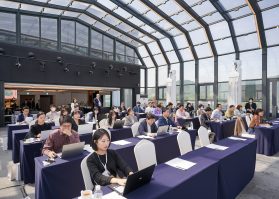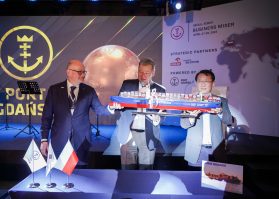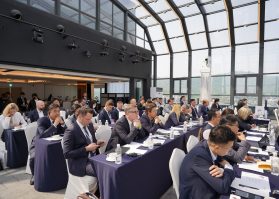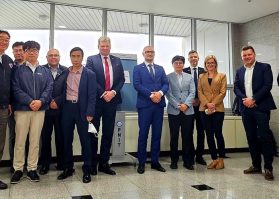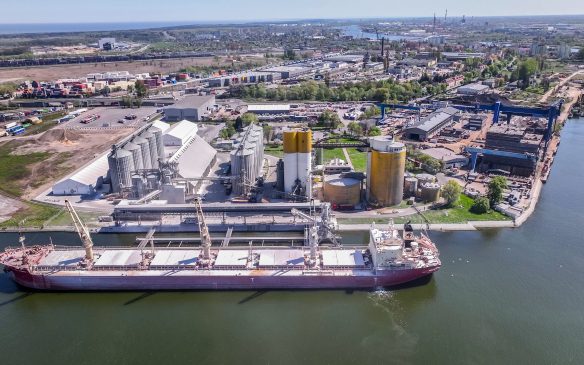South Korean business drives the Polish economy
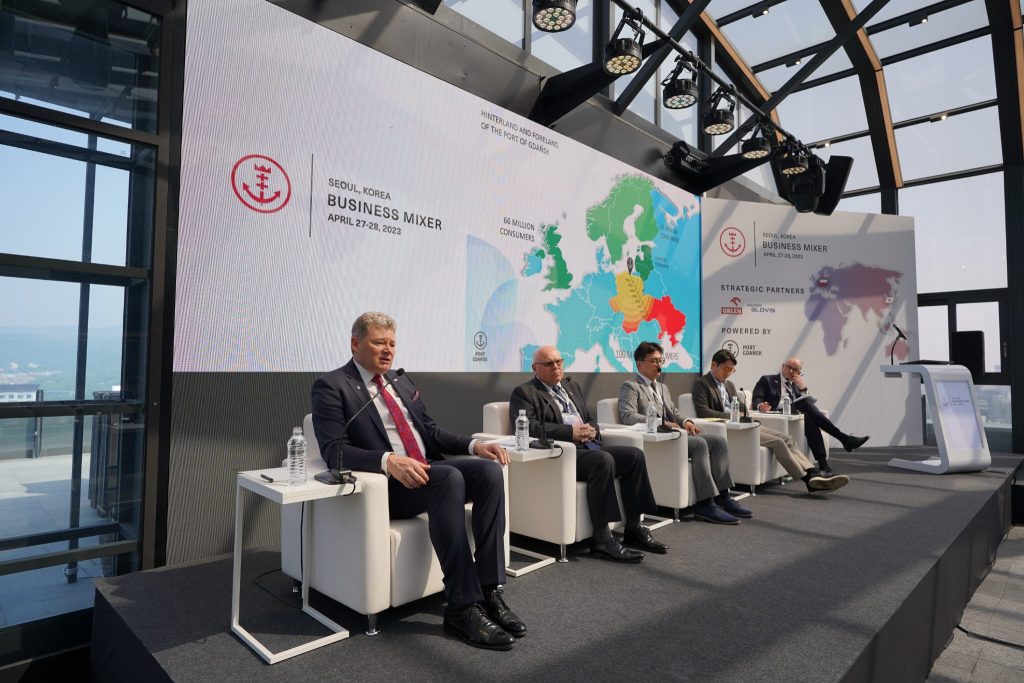
Poland is increasingly perceived as a good place to establish a business and an attractive and reliable business partner, also by South Korean companies. A great opportunity to build or strengthen business relations between Polish and South Korean companies was provided by the Port of Gdańsk Authority S.A., who organised “Business Mixer 2023”, an international conference that took place in Seoul on 27-28 April. It was held under the patronage of the Ministry of Infrastructure.
Today, South Korea is a leading foreign investor in Poland. There are nearly 550 companies with South Korean capital in Poland, and this puts the Republic of Korea in second place, after the USA, among the largest non-European investors in Poland. In late 2020, the value of all investments from South Korea in Poland amounted to EUR 3.06 billion. South Korean entrepreneurs are investing in greenfield projects in Poland, implementing modern technologies and their own know-how. They have become a key investor in many Polish industries as well as a reliable partner in innovation. According to data from the Polish Investment and Trade Agency, entrepreneurs from the Republic of Korea most often choose Poland as a location for advanced electromobility, energy and transportation processes.
The Port of Gdańsk, Poland’s largest port, acts as a perfect intermediary. For Asia, we are a marine gateway to the markets of Central and Eastern Europe, the most dynamically developing region of the European Union. It is an ideal sales market of 100 million consumers, but also an important place for the production and constantly growing exports of high-quality products to markets all over the world.
Although Poland and South Korea are separated by almost 8,000 km, it is safe to say that we definitely have more in common than not. We have a surprisingly similar history. This is the history of the struggle for independence, autonomy and the right to self-determination. Our close relations are based on shared values such as democracy, human rights and respect for tradition – said Sławomir Michalewski, vice-president of the Port of Gdańsk, at the opening of the conference. South Korea lived in the shadows for decades – especially in the shadow of Japan. Until 1989, Poland existed as a country within the socialist Eastern Bloc behind the Iron Curtain. For us Poles, South Korea is a country of new and advanced technologies combined with hardworking people who consider duty a sacred matter. And what do South Koreans associate Poland with? It turns out that they associate our country with Chopin, the Solidarity movement, porcelain tableware from Bolesławiec and beautiful nature. I have recently learned that Poland is also a frequent choice, not least because of its direct flight connection for the honeymoon of young South Korean couples.
Fruitful discussions
The Port of Gdańsk has invited Polish companies from the energy, logistics, design, chemical and automotive industries to participate in the event. In four discussion panels, Polish and South Korean business representatives presented their vision of building alternative bridges connecting Europe and Asia using Poland and South Korea as logistics hubs. The Port of Gdańsk’s strategic location, modern infrastructure, competitive prices and special economic zone status give it an advantage over other European ports. These qualities have contributed to the growth and success of the port in recent years, making it an important hub for trade and investment between Asia and Europe.
As part of the Business Mixer, 4 discussion panels were held. The first was devoted to the topic of: “Seaports as a window to the world of global business”. It was attended by representatives of: The Port of Gdańsk Authority, the Baltic Hub terminal, South Korea’s Port of Busan (its largest port), and PSA South Korea (The PSA Group is one of the world’s largest container operators, which owns the world’s largest container port in Singapore, and is also a shareholder in the Baltic Hub at the Port of Gdańsk). In global trade, nearly 90 per cent of goods are transported by sea.
– In the area of the Port of Gdańsk, approximately USD 1.5 billion has been spent on various investments over the past six years, such as dredging port channels, fairways, repairs to buildings and quays, breakwaters, railway tracks, siding stations, viaducts, and roads for motor vehicles, explained Sławomir Michalewski, Vice President of the Port of Gdańsk. – This modernised access infrastructure meets the standards expected by international maritime participants and makes shipowners as well as large logistics companies more and more willing to choose our port as their distribution hub. Some of the world’s largest container ships, with a capacity of nearly 24,000 TEUs and owned by the shipping market leaders, arrive twice a week. We currently operate 15 regular sea connections and remain the only Baltic port that operates direct container connections to China. The modern Baltic Hub Container Terminal, the secure access infrastructure to the port and the extensive network of shipping connections all mean that the Port of Gdańsk is strengthening its position on the container map of the Baltic Sea year by year. According to the ranking of the largest Baltic container ports, we are ranked first in terms of container handling. In addition, we are the fastest-growing port in Europe of the last decade. In the ranking of European ports, we are 13th. Over the past six years, port handling in Gdańsk has increased by 83 per cent, reaching the absolute best result ever in 2022 – 68.2 million tonnes, which has enabled us to take second place in the Baltic in terms of total handling. If forecasts for oil and coal handling volumes prove to be accurate, it is reasonable to assume that 2023 will be an even better year. I also encourage investors to locate their businesses here. We still have over 100 ha of land available for development.
The Port of Busan is visited annually by more than 80,000 ships carrying 200 million tons of cargo. It handles more than 22 million TEUs per year. It intends to become a global logistics hub, reaching a capacity of 30 million TEUs in the next five years.
The title of the next panel was ‘Big fish need a large port – logistics in the process of constructing industrial projects’. The discussion covered the largest petrochemical investment in Europe being built in Poland – the Olefin III project by PKN ORLEN, which is being constructed using the infrastructure of the Port of Gdańsk. The representatives of PKN ORLEN, Hyundai Engineering and DSV, as well as the Pomeranian Special Economic Zone, took part in the discussion.
“The changing global economy and geopolitical situation has given impulse to strengthen business cooperation between Europe and the North East Asian region. Cooperation with South Korea is particularly important for Poland. Therefore, the signing of the agreement between the PSSE (Pomeranian Special Economic Zone) and the BJFEZ (Busan-Jinhae Free Economic Zone) is a very important step to promote business relations between PSSE and BJFEZ investors. The agreement between the Port of Gdańsk and the BPA (Busan Port Authority) is also an important step’, assured Przemysław Sztandera, president of the PSSE.
PSSE, as part of the Polish Investment Zone, is a business support institution for foreign and domestic investors who are beneficiaries of income tax exemptions. The zone operates comprehensively, cooperating with all regional partners, including the Port of Gdańsk.
The third panel focused on the question: “Is it the end of “Just-in-Time”? It concerned the warehouse market in Europe and South Korea. The Polish warehouse market is in the spotlight, especially in the vicinity of seaports, where demand strongly exceeds supply. Representatives from Panattoni Europe, Langowski Logistics, the Port of Busan, and NetVest Group spoke about the cooperation of warehouses and ports, stock ordering and nearshoring.
‘Business Mixer is a great opportunity to establish new NetVest Group business relationships. Our rapidly growing e-commerce centre, E-packsend, and the abcKosmetyczne.pl store have been serving and selling South Korean cosmetics worldwide for several years now. The visit to South Korea certainly opens the door for the Polish Cosmetics Group to distribute more South Korean brands in Poland and to sell Polish cosmetics on the South Korean market. The first fruitful meetings have already been held, and the next ones look to be just as promising. NetVest Group is going to use the services of its long-standing business partner, the Port of Gdańsk’, said Łukasz Szutenberg, CEO of NetVest Group.
The last panel was the most technological. “Hydrogen is on the way to the Port of Gdańsk – using hydrogen to transport goods by land”. It was attended by representatives from PKN ORLEN, Adampol, Hyundai Glovis and PRS.
The panellists discussed what technologies are going to dominate the TSL industry. Does the future of truck transport belong to hydrogen-powered vehicles? They discussed investments in infrastructure related to the establishment of hydrogen stations.
‘Nowadays, global logistics with all its supply chain problems needs strong partnerships and unconventional solutions to get back on track’, said Krzysztof Dakowicz – President of Adampol S.A., the largest automotive operator at the Port of Gdańsk, a company belonging to the Hyundai Glovis Group.
The development of hydrogen technologies is one of the key elements of the energy transformation. ORLEN Group has prepared the ‘Hydrogen Strategy until 2030’, which defines the company’s objectives in four key areas: mobility; refinery and petrochemicals; industry and energy; and research and development. PKN ORLEN has a very precise roadmap for the implementation of hydrogen projects. In order to effectively use technologies related to this element, the corporation plans to first implement it in transport and industry. For this purpose, it builds zero- and low-emission hydrogen production facilities and a network of publicly accessible refuelling stations, thus aspiring to be a transformational leader in the Central European market.
‘In light of the fact that we are the largest multi-energy company in the region, our plans and goals for building a hydrogen economy are ambitious and bold. South Korea is one of the pioneers in this field as well as a very good partner for joint activities in the field of hydrogen implementation and development’, says Dominika Niewierska, Director of the Hydrogen Project Coordination and Settlement Department at PKN ORLEN.
The Business Mixer ended with a gala dinner organised by PGA. On the following day, a press conference summing up the event was held, with numerous South Korean journalists in attendance. As a result, the Business Mixer made its presence felt in the South Korean business media.

